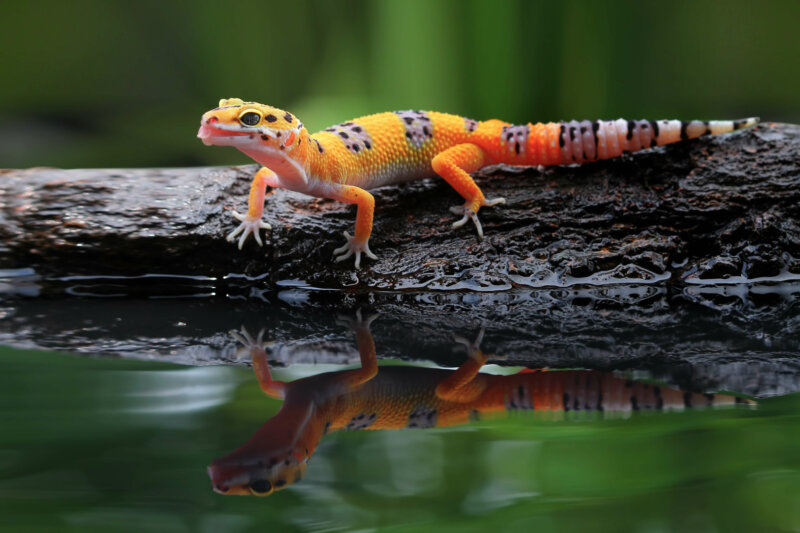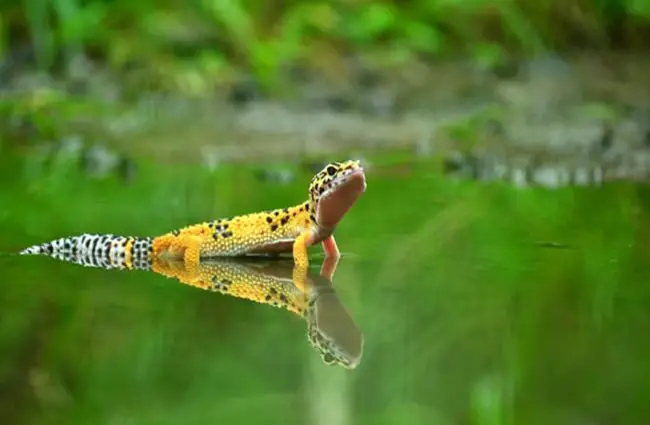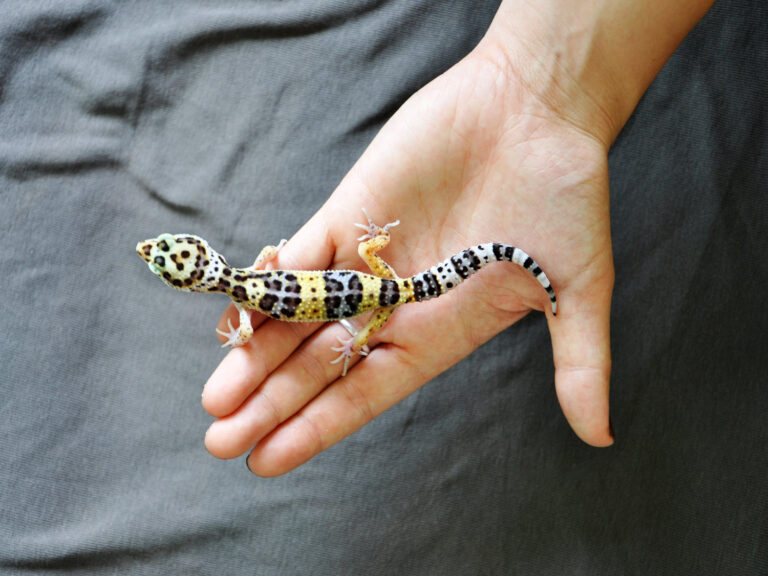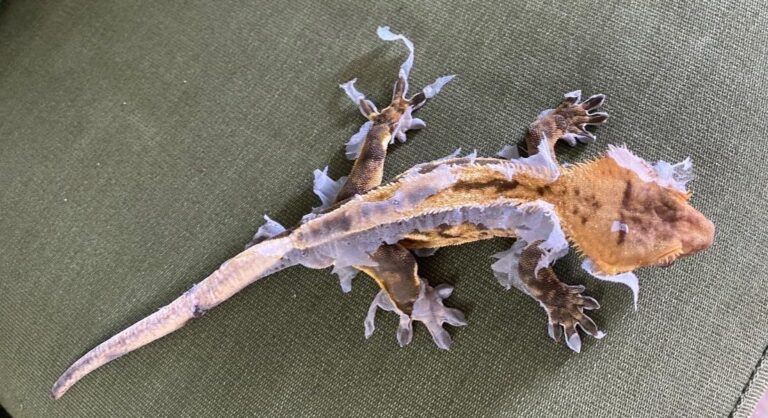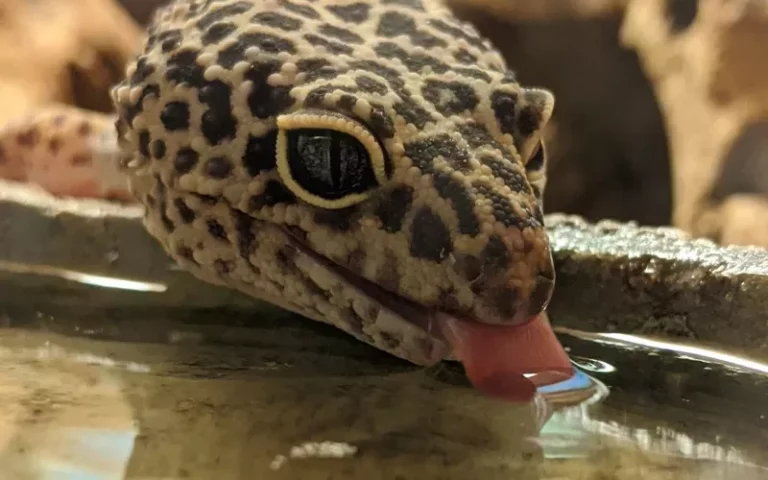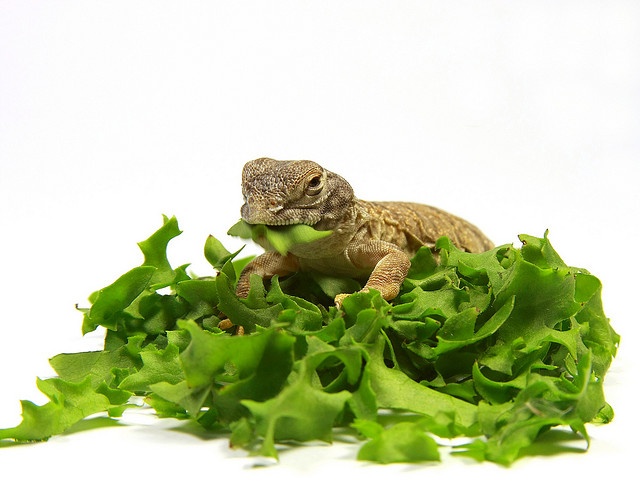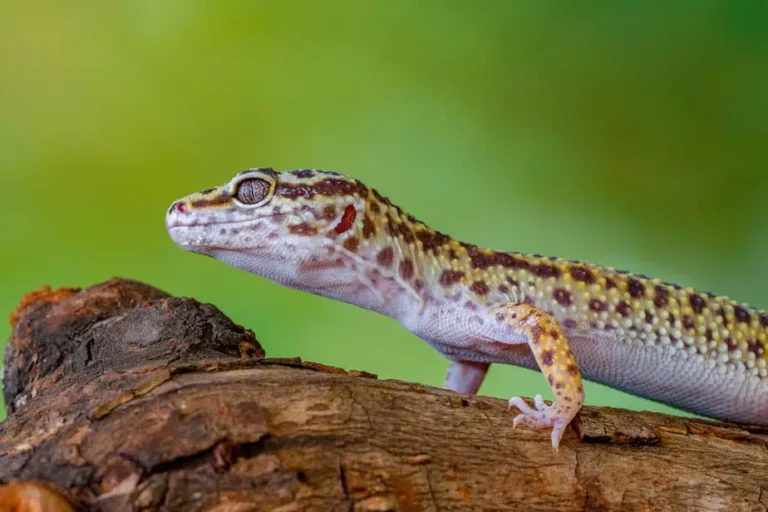How Long Can Leopard Geckos Go Without Food: A Remarkable Survival Story
Have you ever wondered about the remarkable resilience of leopard geckos when it comes to their dietary habits? Picture this: I’m standing in front of my terrarium, peering through the glass, my curiosity piqued by the captivating sight of my leopard gecko, Luna. As I watched her bask under the warm glow of her heat lamp, I couldn’t help but wonder how long can these enchanting creatures go without a meal.
After delving deep into my research, I’ve unearthed a fascinating fact: geckos have the incredible ability to survive for as long as two weeks, Also wild ones can 1-2 months, cause of their unique fat-storing tails. It hinges on several critical factors like Health conditions, the ominous specter of Metabolic Bone Disease (MBD), the size of their tails, and the ever-looming threat of dehydration.
So, let’s embark on a journey to unveil the truth.
How Long Leopard Geckos Can Go Without Food (By Age)
| Age of Leopard Gecko | Size (Approximate) | Maximum Time Without Food |
| Hatchling (0-3 months) | 3-4 inches | 1-2 days |
| Juvenile (3-12 months) | 4-6 inches | 3-5 days |
| Sub-Adult (1-2 years) | 6-8 inches | 7-10 days |
| Adult (2+ years) | 8-10 inches | 10-14 days |
Exploring Leopard Gecko Survival: How Long Can They Thrive Without Food?
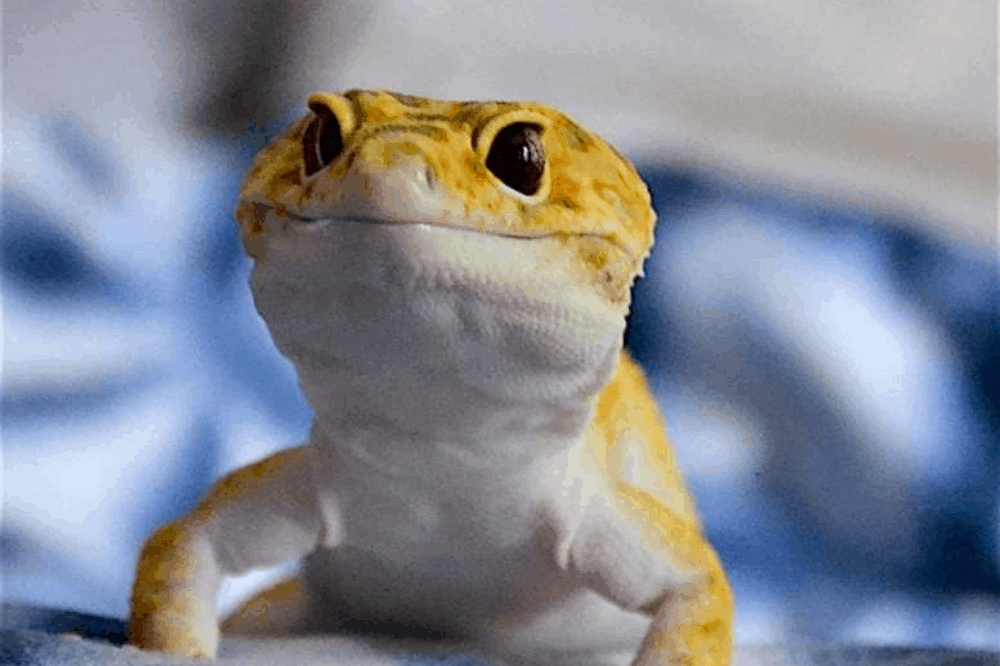
The duration a gecko can endure without food hinges on several factors, primarily linked to their daily energy expenditure. In this comprehensive discussion, we will delve into the intriguing world of these reptiles and uncover the science behind their fasting abilities.
Age:
The age of your leopard gecko plays a crucial role in how long they can go without food.Check out the table mentioned above.
Health Conditions:
Ailing geckos often lack the requisite fat reserves and the capacity to utilize these stores effectively. Consequently, their ability to go without food or water diminishes significantly, as their bodies require essential nutrients to support the immune system and combat illnesses. If your gecko exhibits signs of sickness and ceases eating, it is imperative to seek prompt veterinary care.
Metabolic Bone Disease (MBD):
MBD is a dire affliction that occurs when these reptiles fail to receive essential nutrients, particularly calcium. The absence of calcium leads to the extraction of this vital mineral from its skeletal structure, resulting in deformities, fractures, and a painful decline in health.
In addition, even seemingly well-fed geckos can succumb to MBD if not provided with a balanced diet of calcium-dusted and gut-fed feeder insects.
Breeding Season:
During the breeding season, both male and female geckos may abstain from eating for several days or even weeks, particularly at the outset of this period. While this behavior is normal, vigilant monitoring is necessary to ensure they do not experience excessive weight loss, which could indicate underlying health issues.
Gravid Females:
Gravid females, those carrying eggs, may temporarily cease eating for a few days before laying their eggs. This natural behavior should not cause concern, as they typically resume eating once the egg-laying process is complete, with no significant impact on their overall health.
Tail Size and Tail Loss:
The gecko’s tail serves as a repository for fat and water reserves, critical for times of need such as brumation or illness. When a gecko loses its tail, it loses these reserves in one fell swoop, potentially endangering its health.
Moreover, proper post-tail-loss care, including adequate nutrition, hydration, and supplementation, is essential for their well-being. While a gecko’s tail can regenerate in as little as two months, it takes time to restore healthy fat reserves.
Dehydration:
While these reptiles can endure extended periods without food, they cannot survive without water for long. Dehydration poses a severe risk, as they rely on food and water intake for fluid replenishment.
Further, symptoms of dehydration include dry, puckered skin, lethargy, difficulty shedding, and constipation. The severity of dehydration dictates the appropriate course of action, ranging from lukewarm water soaks to immediate veterinary attention.
Brumation:
During brumation, geckos may cease eating altogether, provided the correct temperature conditions (between 50°F and 59°F) are maintained. This behavior is entirely normal, and during this time, providing water and monitoring weight loss are essential responsibilities.
Recognizing Signs of Weight Loss and Behavioral Changes in Your Leopard Gecko: Warning
When your cherished leopard gecko decides to skip a meal or two, it’s typically nothing to fret over. In captivity, these little reptiles often receive more nourishment than they require, and a brief pause in their feeding routine can be a natural way for them to maintain a healthy weight.
Nonetheless, it’s crucial for any responsible leopard gecko owner to remain vigilant and attuned to the subtle signs that could indicate something isn’t quite right with their scaly companion. These warning signals include
Sluggishness or Lethargy: If your leopard gecko is notably less active than usual, displaying an uncharacteristic lack of energy, it may be a cause for concern.
Sunken Eyes: Sunken or noticeably recessed eyes can be an indicator of dehydration or underlying health issues. Healthy leopard geckos typically have bright, alert eyes.
Abdominal Swelling: An unusually swollen abdomen can be a red flag, potentially signaling an underlying digestive or reproductive problem.
Poor Appetite: While skipping a meal here and there is normal, persistent disinterest in food can be indicative of a more profound issue.
Weight Loss: Although leopard geckos are naturally lightweight creatures, a noticeable decrease in their overall body weight, particularly in the tail, is a significant sign that something might be amiss.
Vent Prolapse: A protrusion of the cloacal vent can be a severe issue, often associated with constipation or other health complications.
Weight loss, in particular, can be tricky to detect initially, as the fat stored in their tails can mask subtle changes. However, a progressively thinner tail should set off alarm bells, prompting immediate attention and investigation.
Why Your Leopard Gecko Isn’t Eating: Uncovering the Culprits
1. Transition Stress:
The initial days in a new home can be anxiety-inducing for leopard geckos. The stress of relocation often leads to a temporary refusal of food. To ease their adjustment, ensure that their enclosure is set up correctly before introducing them to it.
Additionally, maintain a serene environment free from disturbances, keeping interactions minimal during this acclimation period.
2. Incorrect Tank Setup:
Inadequate tank conditions, particularly incorrect temperatures, can significantly affect your gecko’s appetite. Insufficient warmth can slow down their metabolism, hindering digestion, while excessive heat can lead to dehydration or, in severe cases, endanger their lives.
Also, a temperature gradient within the tank, offering a warm and cool zone, is vital to allow your gecko to regulate its body temperature. The recommended temperature ranges are 90-92°F (32-33°C) for the warm zone and 70-77°F (21-25°C) for the cool zone, with humidity maintained between 30% and 40%.
3. Breeding-Related Behavior:
During the breeding season, leopard geckos, especially females, may temporarily forgo their meals. Gravid females may abstain from eating a couple of days before laying their eggs.
While it’s normal for them to lose a few grams during this time, continue offering food as they require additional nutrients for egg production. Calcium supplementation becomes crucial during this period.
4. Brumation:
In the wild, leopard geckos undergo brumation, a hibernation-like state, during colder months. As they prepare for brumation, they exhibit specific signs such as spending more time in the cooler part of the tank, reduced activity, and hiding for extended periods.
Approximately two weeks before entering brumation, they stop eating to empty their digestive tract, preventing food from rotting inside them during this dormant phase. While it’s normal for them not to eat during brumation, monitor their weight to ensure it doesn’t drop by more than 10%, as excessive weight loss may indicate underlying health issues.
5. Impaction:
Gut blockages, known as impaction, can disrupt your gecko’s eating habits and pose a severe threat. Symptoms include loss of appetite, reduced activity, abdominal swelling, and vent prolapse.
Additionally, attempting a lukewarm bath with gentle stomach massage as a home remedy might help alleviate impaction. However, if it persists, immediate veterinary attention, including potential surgery, may be necessary.
6. Diseases:
Various illnesses, such as respiratory infections, parasites, and metabolic bone disease (MBD), can induce appetite loss in leopard geckos. Respiratory infections are preventable by maintaining appropriate humidity levels (30-40%) in the tank. If a respiratory infection is suspected, consult a veterinarian.
Besides, parasitic infestations, including the highly infectious Cryptosporidia, can cause significant weight loss, appetite loss, diarrhea, and stunted growth. Depending on the severity, euthanasia may be considered as advised by your vet. MBD, characterized by weakness and illness, can also lead to eating difficulties, necessitating professional medical attention.
How To Tempt Your Leopard Gecko To Eat?
Offer Their Favorite Treats: Present them with their preferred treats, such as silkworms, waxworms, or dubia roaches. However, exercise caution not to overindulge them in these treats, as you wouldn’t want them to develop a preference solely for treats in the long run.
Try Partially Frozen Mealworms: Try offering a mealworm that has been partially frozen. Placing the mealworm in the fridge for a short time will have an anesthetic effect, making it easier for your gecko to catch and consume.
Hand-Feeding: Attempt to hand-feed your leopard gecko. Sometimes, the personal interaction and the novelty of being hand-fed can entice them to eat.
What should you do if your leopard gecko is lost in your house?
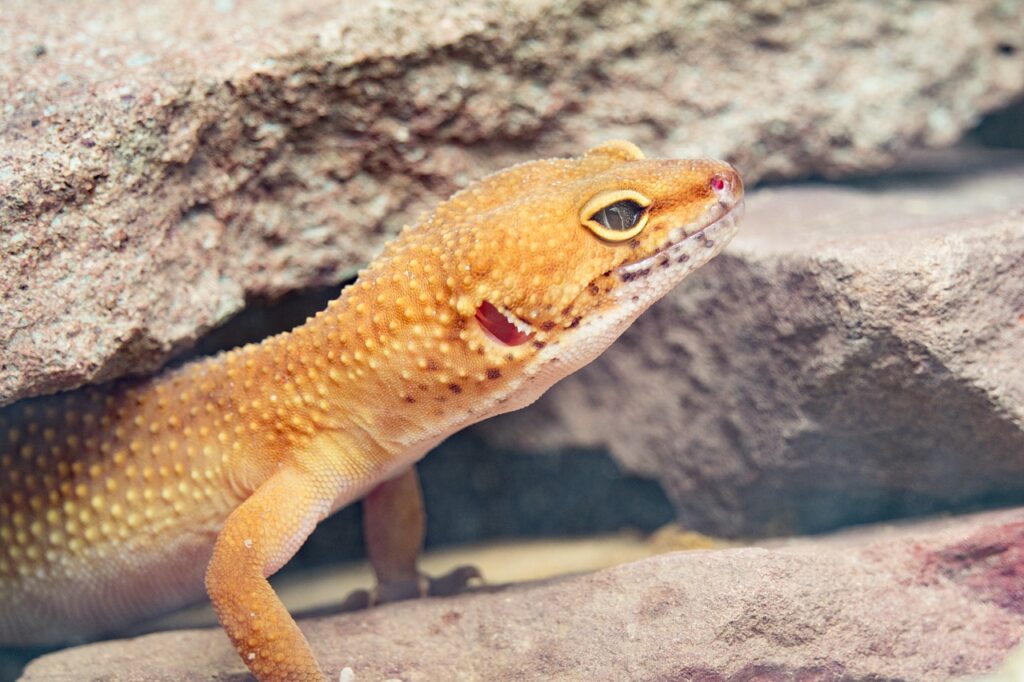
Finding a lost leopard gecko in your house can be challenging, but there’s hope:
Check for Predators: If you have other pets that may harm the gecko, isolate those pets to prevent any harm.
Maintain Temperature: Keep your house or the room where the gecko tank is at a temperature similar to their tank. This prevents them from getting too cold.
Search Thoroughly: Start a systematic search of your house, moving furniture carefully. Be patient and persistent. They can survive for several weeks without food but may become harder to find.
What should you do if your leopard gecko’s food supply runs out?
Healthy adult geckos can live off their fat reserves for a while. Ensure they have water available. However, young geckos (under 2 months old) should not go without food for too long. When you can restock, provide them with fatty foods like mealworms to help them regain energy.
How should you adjust feeding your leopard gecko when you’re away?
Short Trips (1-2 Days): If you’re only gone for a day or two, and your gecko is an adult, you don’t necessarily need to arrange for someone to feed them. Adults can go without food for a short period. However, ensure they have access to clean water.
Baby Leopard Geckos: Baby requires daily feeding, so if you have a baby, you should arrange for someone to feed them while you’re away. Don’t leave baby geckos without food for an extended period.
Juveniles: Juveniles should be fed every other day, so you’ll need someone to feed them if you’re gone for more than a day.
Alternative Food Sources: If you can’t find someone to feed live prey to your gecko, you can try freeze-dried mealworms, which you can purchase online or at pet stores that cater to your companion.
Water Maintenance: Regardless of feeding, it’s essential to have someone check and change your gecko’s water every other day, if not daily, to ensure they stay hydrated.
FAQs
How Long Does It Take For A Leopard Gecko To Starve To Death?
Leopard geckos can survive for several weeks without food, but it’s not recommended to let them go without food for more than 2-4 weeks to ensure their well-being.
How Much Food Should Your Leopard Gecko Get?
Adult leopard geckos typically require 4-6 appropriately sized insects, like crickets or mealworms, every 2-3 days. Adjust portion sizes for juveniles and monitor their appetite.
Is There A Best Time Of Day For Feeding Leopard Geckos?
Yes, Leopard geckos are crepuscular, meaning they’re most active during dawn and dusk. Feeding during these times often aligns with their natural feeding behavior.
How long can a leopard gecko go without water?
While they can endure longer periods without water compared to food, it’s essential to provide fresh water in a shallow dish at all times. They should not go more than a day or two without access to water.
Can I leave food in my gecko tank?
No, Leaving uneaten insects in the tank is not recommended as they can stress your gecko or even bite them. Remove uneaten prey after a feeding session to maintain a clean and stress-free environment.
Final word:
In conclusion, leopard geckos are fascinating creatures with a surprising ability to go without food for a while if needed. From my experience as a leopard gecko owner, I’ve learned that adults can typically endure periods of up to 10- to two weeks without eating, although this can vary depending on their age, health, and living conditions.
However, it’s crucial to emphasize that this should not be seen as an excuse to neglect their dietary needs. Providing these little reptiles with a consistent and balanced diet is essential for their overall health and well-being.
Also, as someone who cares deeply for my leopard gecko, I believe it’s my responsibility to ensure they receive proper nutrition and care to promote their longevity and vitality.
If you ever find yourself concerned about your leopard gecko’s diet or health, I would strongly recommend seeking advice from a veterinarian or a reptile expert. They can provide valuable guidance to ensure your gecko remains happy and healthy for years to come.

